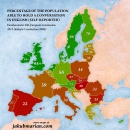 |
“United States is” / “United States are” – plural or singular?
The United States has always been causing (grammatical) trouble… or have been? “The United States” was treated as a plural noun in most (...)
June 28, 2014 – Jakub Marian – English
|
 |
“All that” / “all what” / “all which” in English
English learners often use an incorrect pronoun after the word “all”. Long story short, what you most likely want to say is “all that (...)
June 25, 2014 – Jakub Marian – English
|
 |
“Use to do” in English
One of the constructions English learners learn quite early is “someone used to do something”. It expresses that someone did something (...)
June 20, 2014 – Jakub Marian – English
|
 |
“On the Internet” / “in the Internet”, capital I
Prepositions are a common source of mistakes for learners of any language. The word “Internet” is especially problematic for an English (...)
June 18, 2014 – Jakub Marian – English
|
 |
‘Dot’, ‘period’, ‘full stop’, and ‘point’ in English
These four expressions, dot, period, full stop, and point, are often confused by learners. The distinction is actually rather simple. The (...)
June 17, 2014 – Jakub Marian – English
|
By the way, have you already seen my brand new web app for non-native speakers of English? It's based on reading texts and learning by having all meanings, pronunciations, grammar forms etc. easily accessible. It looks like this:
 |
Vocabulary in Harry Potter and the Philosopher’s Stone (first chapter)
When I started working on this website, I published a few articles about English vocabulary I considered interesting. I prepared drafts (...)
June 13, 2014 – Jakub Marian – English
|
 |
Map of the percentage of people speaking English in the EU by country
Some native English speakers’ attitude towards learning foreign languages could be summarized as “why should I learn a foreign language if (...)
|
 |
‘Both’ vs. ‘either’ in English
Learners of English quite often confuse the words “both” and “either”, probably because these tend to be translated using a single word (...)
May 27, 2014 – Jakub Marian – English
|
 |
“I wish he did” / “I wish he would do” in English
English conditional is one of the most common sources of mistakes for non-native speakers. The most common pattern for conditional (...)
May 25, 2014 – Jakub Marian – English
|
 |
‘A couple is’ / ‘a couple are’ in English
A common mistake: English learners see “a couple”, which is in the singular, and assume that the verb must be in the singular, too. (...)
May 23, 2014 – Jakub Marian – English
|

